Related Research Articles
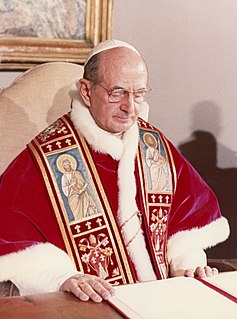
Humanae vitae is an encyclical written by Pope Paul VI and dated 25 July 1968. The text was issued at a Vatican press conference on 29 July. Subtitled On the Regulation of Birth, it re-affirmed the teaching of the Catholic Church regarding married love, responsible parenthood, and the rejection of artificial contraception. In formulating his teaching he explained why he did not accept the conclusions of the Pontifical Commission on Birth Control established by his predecessor, Pope John XXIII, a commission he himself had expanded.

Pope Paul VI was head of the Catholic Church and sovereign of the Vatican City State from 21 June 1963 to his death in 1978. Succeeding John XXIII, he continued the Second Vatican Council, which he closed in 1965, implementing its numerous reforms. He fostered improved ecumenical relations with Eastern Orthodox and Protestant churches, which resulted in many historic meetings and agreements.

Umberto Eco was an Italian medievalist, philosopher, semiotician, novelist, cultural critic and political and social commentator. In English, he is best known for his popular 1980 novel The Name of the Rose, a historical mystery combining semiotics in fiction with biblical analysis, medieval studies and literary theory, as well as Foucault's Pendulum, his 1988 novel which touches on similar themes.
Dignitatis humanae is the Second Vatican Council's Declaration on Religious Freedom. In the context of the council's stated intention "to develop the doctrine of recent popes on the inviolable rights of the human person and the constitutional order of society", Dignitatis humanae spells out the church's support for the protection of religious liberty. It set the ground rules by which the church would relate to secular states.
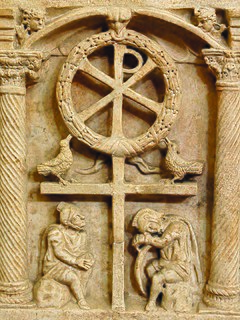
In politics, integralism, integrationism or integrism is the principle that the Catholic faith should be the basis of public law and public policy within civil society, wherever the preponderance of Catholics within that society makes this possible. Integralists uphold the 1864 definition of Pope Pius IX in Quanta cura that the religious neutrality of the civil power cannot be embraced as an ideal situation and the doctrine of Leo XIII in Immortale Dei on the religious obligations of states.
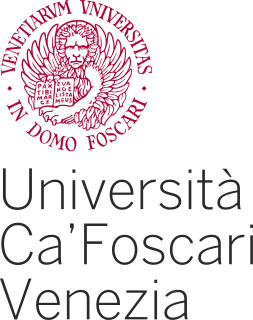
Ca' Foscari University of Venice is a public university in Venice, Italy. Since its foundation in 1868, it has been housed in the Venetian Gothic palace of Ca' Foscari, from which it takes its name. The palace stands on the Grand Canal, between the Rialto and San Marco, in the sestiere of Dorsoduro.
A culture of life describes a way of life based on the belief that human life at all stages from conception through natural death is sacred. It opposes the destruction of human life at any stage, including abortion, euthanasia, capital punishment, studies and medicines involving embryonic stem cells, and contraception. It also promotes policies that "lift up the human spirit with compassion and love." The term originated in moral theology, especially that of the Catholic Church, and was popularly championed by Pope John Paul II; it has been widely used by religious leaders in evangelical Christianity as well. The philosophy of such a culture is a consistent life ethic.
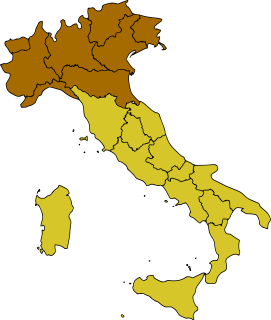
Northern Italy is a geographical and cultural region in the northern part of Italy. Non-administrative itself, it consists of eight administrative regions: Aosta Valley, Piedmont, Liguria, Lombardy, Emilia-Romagna, Veneto, Friuli-Venezia Giulia and Trentino-Alto Adige. As of 2014, its population was 27,801,460. Rhaeto-Romance and Gallo-Italic languages are spoken in the region, as opposed to the Italo-Dalmatian languages spoken in the rest of Italy. The Venetian language is sometimes considered to be part of the Italo-Dalmatian languages, but some major publications such as Ethnologue and Glottolog define it as Gallo-Italic.
Natural family planning (NFP) comprises the family planning methods approved by the Catholic Church and some Protestant denominations for both achieving and postponing or avoiding pregnancy. In accordance with the Church's teachings regarding sexual behavior, NFP excludes the use of other methods of birth control, which it refers to as "artificial contraception".
Janet Elizabeth Smith is an American classicist and philosopher, and former professor of moral theology at the Sacred Heart Major Seminary in Detroit, Michigan.
Religious adherents vary widely in their views on birth control. This can be true even between different branches of one faith, as in the case of Judaism and Christianity. Some religious believers find that their own opinions of the use of birth control differ from the beliefs espoused by the leaders of their faith, and many grapple with the ethical dilemma of what is conceived as "correct action" according to their faith, versus personal circumstance, reason, and choice. This article will discuss various views on birth control of the major world religions Christianity, Buddhism, Judaism, Islam, Hinduism, and Baha'i.

Bologna is the capital and largest city of the Emilia-Romagna region in Northern Italy. It is the seventh most populous city in Italy with about 400,000 inhabitants and 150 different nationalities. Its metropolitan area is home to more than 1,000,000 people. It is known as the Fat, Red, and the Learn'd City due to its rich cuisine, red Spanish tiled rooftops, left-wing politics, and being home to the oldest university in the world.
The Pontifical Commission on Birth Control was a committee within the Roman Curia tasked with analyzing the modern impact of birth control on the Roman Catholic Church. The disagreements within the commission ultimately led to the publication of the encyclical Humanae vitae.
Massimo Faggioli is an Italian academic, Church historian, professor of theology and religious studies at Villanova University, columnist for La Croix International, and contributing writer to Commonweal.
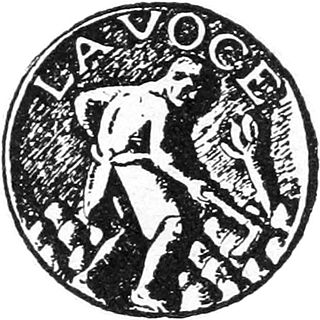
La Voce was an Italian weekly literary magazine which was published in Florence, Italy, between 1908 and 1916. The magazine is also one of the publications which contributed to the cultural basis of the early forms of Fascism.
The following is a timeline of the history of the city of Bologna, Emilia-Romagna region, Italy.
Il Politecnico was an Italian language Communist cultural and literary magazine published in Milan, Italy, between 1945 and 1947. In an editorial in the first issue it was stated that the magazine was inspired by the homonymous journal which had been founded by Carlo Cattaneo in 1839 and published until 1845.
Il Verri is an Italian quarterly literary magazine, which has been published since 1956. The magazine is based in Milan, Italy.
The following is a timeline of the history of the city of Parma in the Emilia-Romagna region of Italy.
References
- 1 2 3 Andrea Gagliarducci (18 July 2015). "The slow demise of Catholic magazines in Italy". Catholic News Agency. Rome. Retrieved 8 October 2021.
- ↑ Gino Moliterno, ed. (2002). Encyclopedia of Contemporary Italian Culture. London; New York: Routledge. p. 143. ISBN 978-1-134-75877-7.
- ↑ Daniela Saresella (2017). "The Battle for Divorce in Italy and Opposition from the Catholic World (1861–1974)". Journal of Family History. 42 (4): 401–418. doi:10.1177/0363199017725468. S2CID 148963172.
- ↑ "Il Regno" (in Italian). Paoline Store. Retrieved 8 October 2021.
- ↑ Francesca Vassalle; Massimo Faggioli (2018). "A Kind of Reformation in Miniature: The Paradoxical Impact of Humanae Vitae in Italy". In Alana Harris (ed.). The Schism of ’68: Catholicism, Contraception and Humanae Vitae in Europe, 1945-1975. Cham: Palgrave Macmillan. p. 222. ISBN 978-3-319-70811-9.
- ↑ Patrick McCarthy (1997). "Italy: A new language for a new politics?". Journal of Modern Italian Studies. 2 (3): 349. doi:10.1080/13545719708454957.
- ↑ "La rivista "Il Regno" continua: evviva!" (in Italian). Il blog di Luigi Accattoli. 7 January 2016. Retrieved 8 October 2021.